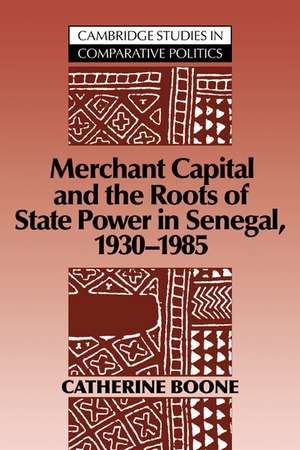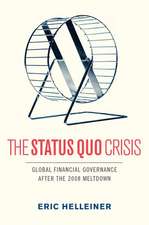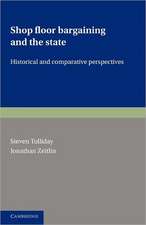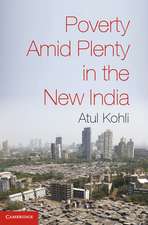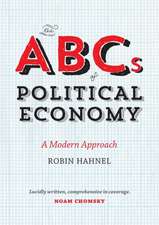Merchant Capital and the Roots of State Power in Senegal: 1930–1985: Cambridge Studies in Comparative Politics
Autor Catherine Booneen Limba Engleză Paperback – noi 2006
| Toate formatele și edițiile | Preț | Express |
|---|---|---|
| Paperback (1) | 288.62 lei 6-8 săpt. | |
| Cambridge University Press – noi 2006 | 288.62 lei 6-8 săpt. | |
| Hardback (1) | 1020.17 lei 6-8 săpt. | |
| Cambridge University Press – 29 oct 1992 | 1020.17 lei 6-8 săpt. |
Din seria Cambridge Studies in Comparative Politics
-
 Preț: 179.15 lei
Preț: 179.15 lei -
 Preț: 267.61 lei
Preț: 267.61 lei -
 Preț: 239.36 lei
Preț: 239.36 lei - 9%
 Preț: 594.67 lei
Preț: 594.67 lei -
 Preț: 160.82 lei
Preț: 160.82 lei -
 Preț: 269.58 lei
Preț: 269.58 lei -
 Preț: 264.74 lei
Preț: 264.74 lei -
 Preț: 177.28 lei
Preț: 177.28 lei -
 Preț: 225.70 lei
Preț: 225.70 lei -
 Preț: 164.94 lei
Preț: 164.94 lei -
 Preț: 236.42 lei
Preț: 236.42 lei -
 Preț: 185.64 lei
Preț: 185.64 lei -
 Preț: 233.13 lei
Preț: 233.13 lei -
 Preț: 206.71 lei
Preț: 206.71 lei -
 Preț: 231.82 lei
Preț: 231.82 lei -
 Preț: 206.52 lei
Preț: 206.52 lei -
 Preț: 201.24 lei
Preț: 201.24 lei -
 Preț: 358.37 lei
Preț: 358.37 lei -
 Preț: 203.42 lei
Preț: 203.42 lei -
 Preț: 232.45 lei
Preț: 232.45 lei -
 Preț: 257.82 lei
Preț: 257.82 lei -
 Preț: 191.12 lei
Preț: 191.12 lei -
 Preț: 158.77 lei
Preț: 158.77 lei -
 Preț: 199.05 lei
Preț: 199.05 lei - 11%
 Preț: 553.80 lei
Preț: 553.80 lei - 11%
 Preț: 695.06 lei
Preț: 695.06 lei -
 Preț: 288.80 lei
Preț: 288.80 lei -
 Preț: 262.06 lei
Preț: 262.06 lei - 11%
 Preț: 691.66 lei
Preț: 691.66 lei -
 Preț: 388.29 lei
Preț: 388.29 lei -
 Preț: 288.04 lei
Preț: 288.04 lei -
 Preț: 228.00 lei
Preț: 228.00 lei -
 Preț: 385.28 lei
Preț: 385.28 lei -
 Preț: 312.89 lei
Preț: 312.89 lei -
 Preț: 224.44 lei
Preț: 224.44 lei -
 Preț: 287.07 lei
Preț: 287.07 lei -
 Preț: 251.27 lei
Preț: 251.27 lei -
 Preț: 313.70 lei
Preț: 313.70 lei -
 Preț: 277.38 lei
Preț: 277.38 lei -
 Preț: 423.79 lei
Preț: 423.79 lei - 11%
 Preț: 552.94 lei
Preț: 552.94 lei - 11%
 Preț: 554.43 lei
Preț: 554.43 lei - 14%
 Preț: 783.26 lei
Preț: 783.26 lei
Preț: 288.62 lei
Nou
Puncte Express: 433
Preț estimativ în valută:
55.24€ • 57.45$ • 46.22£
55.24€ • 57.45$ • 46.22£
Carte tipărită la comandă
Livrare economică 15-29 martie
Preluare comenzi: 021 569.72.76
Specificații
ISBN-13: 9780521030397
ISBN-10: 0521030390
Pagini: 320
Ilustrații: 4 b/w illus. 23 tables
Dimensiuni: 152 x 230 x 18 mm
Greutate: 0.47 kg
Editura: Cambridge University Press
Colecția Cambridge University Press
Seria Cambridge Studies in Comparative Politics
Locul publicării:New York, United States
ISBN-10: 0521030390
Pagini: 320
Ilustrații: 4 b/w illus. 23 tables
Dimensiuni: 152 x 230 x 18 mm
Greutate: 0.47 kg
Editura: Cambridge University Press
Colecția Cambridge University Press
Seria Cambridge Studies in Comparative Politics
Locul publicării:New York, United States
Cuprins
List of tables and figures; Preface and acknowledgements; Introduction; 1. Capital and contingencies of post-colonial politics; 2. The colonial market; 3. Consolidation of a regime: neo-colonialism in the 1960s; 4. Growth of Senegal's textile industry, 1960–75; 5. Reappropriation of the state: the 1970s; 6. Demise of the Dakar textile industry; 7 Conclusion: states, capital and capitalist states; Appendix: exchange rates; References; Index.
Recenzii
"...an economic story about politics and a political story about colonial and neocolonial economies...this book could take its place alongside the classic economic history of the rise of capitalism in Europe, and in Britain in particular." ASA News
"Boone has produced a splendid book. In its theoretical intelligence and empirical richness, it is one of the most important recent works on African political economy." Comparative Politics
"...a balanced judgement and humane. This is an impressive contribution to the literature on the wobbly underpinnings of the African state." Journal of African Studies
"With a comprehensive discussion ranging from the financing and marketing of textiles to grand sociological theory, the book is an impressive achievemnt, deserving a place in respectable Africa collections...." H. Glickman, Choice
"...this book represents a real step towards the understanding of Africa's current state, and why it remains elusive to neoclassical economists and developmentalists." Mohamed Mbodi, International Journal of African Historical Studies
"Boone's elegant study is highly focused and detailed....add[s] important new dimensions to the ongoing debate." Patrick O'Meara, Journal of Politics
"...instructive for anyone concerned with the politics of economic reform, not only in Africa but in postcommunist Eastern Europe as well." Ronald Kassimir, Contemporary Sociology
"Boone has produced a splendid book. In its theoretical intelligence and empirical richness, it is one of the most important recent works on African political economy." Comparative Politics
"...a balanced judgement and humane. This is an impressive contribution to the literature on the wobbly underpinnings of the African state." Journal of African Studies
"With a comprehensive discussion ranging from the financing and marketing of textiles to grand sociological theory, the book is an impressive achievemnt, deserving a place in respectable Africa collections...." H. Glickman, Choice
"...this book represents a real step towards the understanding of Africa's current state, and why it remains elusive to neoclassical economists and developmentalists." Mohamed Mbodi, International Journal of African Historical Studies
"Boone's elegant study is highly focused and detailed....add[s] important new dimensions to the ongoing debate." Patrick O'Meara, Journal of Politics
"...instructive for anyone concerned with the politics of economic reform, not only in Africa but in postcommunist Eastern Europe as well." Ronald Kassimir, Contemporary Sociology
Descriere
A 1993 study of the ways in which the exercise of state power in Africa has inhibited economic growth, focusing on Senegal.
